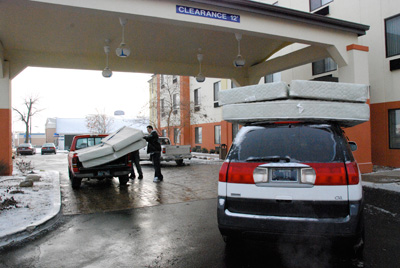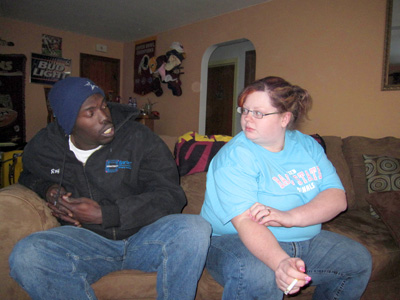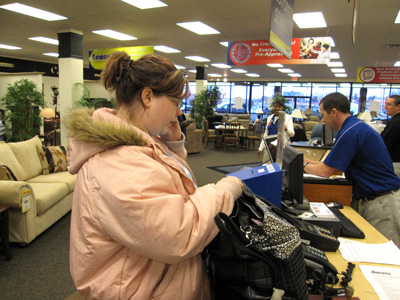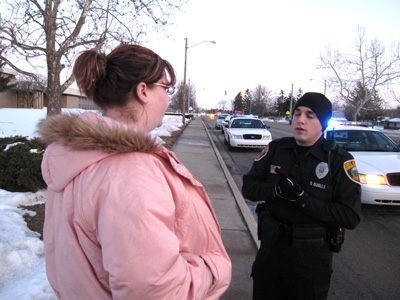Constant Crisis

The Holiday Inn Express in Muncie gave away 83 used mattresses just before Christmas. First come, first served. All you had to do was haul the mattress home and donate $10 to the local food shelf.
Photo by Stephen Smith
Roy Foreman lined up early for his free mattress. It was used, mind you, but free. In hard times, free is good.
Shortly before Christmas, Muncie's Holiday Inn Express announced it was buying new mattresses and would give away its old ones. All Roy had to do was haul the mattress away and donate $10 to the food shelf.
It was a lead-gray, Indiana winter morning. Families with kids waited in the lobby. Roy huddled with Howard Heath in the icy parking lot. Howard is a compact, middle-aged white guy; Roy is a lanky, young African American. Howard owns a small truck. He had picked up his own queen-size mattress yesterday. Now he was helping Roy.
"I can't afford a brand new mattress," Roy says. "Why? Because I don't have a job." Roy was laid-off from an assembly line job in November. "I'm just doing odd jobs right now," Roy says. "Trying to get unemployment, looking for work."
Howard is in the same boat. He was laid off last summer after 30 years as a skilled technician at a heating and air conditioning firm.
"If you look in the newspaper right now in the classified ads, you'll probably see two or three jobs and that's it," Roy says. "The rest is people selling their houses."
Roy and Howard are part of an extended family in Muncie, one that struggles daily to make the best of life at the poverty line. They are among approximately 18 million unemployed and underemployed American workers; people for whom the margin of error is so slender that a used mattress is a windfall, and unpaid parking tickets can lead to catastrophe.

Roy Foreman and Ashley Chalfant at Ashley's dad's house in Muncie.
Photo by Laurie Stern
Roy and Howard are family because Roy lives with Howard's stepdaughter, Ashley Chalfant. Roy, Ashley and their three small children share a subsidized town house in a poor section of Muncie. Roy is 33, Ashley is 23.
As a single mother, Ashley qualifies for government health insurance, free day care, and food stamps. "It's just a lot cheaper to stay boyfriend-girlfriend than it is to get married," she says.
When Roy got laid off, Ashley found a job as a cashier at Walgreens. She was bringing home $450 every two weeks. But Ashley's chronic back pain had become excruciating. Doctors scheduled her for surgery to repair a herniated disc. Ashley was scared about the operation, and worried about how her family would survive for the six weeks she'd be out of work.
"I get one week of full-pay, and then four weeks of half-pay, which is going to be absolutely nothing," she says. " I mean it's not even going to be enough to get groceries."
Ashley met Roy the summer after she finished high school. That fall she went to college in Indianapolis. She was a good student. She wanted a career in criminal justice, maybe as a probation officer. But she got pregnant and dropped out. Tearfully, she says she "messed up." She doesn't regret her kids, but she worries constantly about how to support them.
"It's just buying clothes and the groceries and the bills," she says. "I got my gas bill about three or four days ago, and for one month it's $277, and I have no idea where that money's gonna come from. I just don't have any idea."
Some help will come from Ashley's parents. Her mom, Cindy Heath, works full-time as a cashier at the Ball State University cafeteria. She has become the financial pillar of her extended family. She and her husband Howard have six grown children; all of them have needed help from time to time.
But Roy and Ashley are now the neediest.

Ashley Chalfant stops at the furniture store to make a payment on an overdue bill.
Photo by Laurie Stern
The day before her surgery, Ashley stopped by the rent-to-own furniture store. She had promised to make a payment on an overdue bill. She got a lift because Roy had their car to get the kids from day care. As she left the furniture store, her cell phone rang.
"Oh my god," she mutters.
It's Roy. He's been pulled over for speeding. He had two outstanding warrants for failing to pay traffic fines. The police arrested him. He is going to jail.
Her phone rings again. This time it's the police. They're impounding the car. Ashley is on the verge of hysteria.
"I don't have the money to get the car out of tow," she pleads into the phone. "I need to get my kids."
Then her tone grows defiant. "And what is your name because I'm calling, I'm calling somebody on you! Because what you're doing is illegal. I am on that [car] title too," she yells.
Ashley's problem is worse than she thinks. When she turns the corner she sees her red Dodge Intrepid. There's a line of police cars. A tow truck is idling. Two officers are combing through the toys in the back seat. "Don't touch those," Ashley shouts.
"Hey lady, get away from the car right now," the officer says.
"This is my vehicle."

A Ball State University police officer tells Ashley Chalfant that her boyfriend Roy is going to jail and her car must be impounded.
Photo by Laurie Stern
"You will go to jail if you do not get away from this car."
"For what? What did I do?"
"You are interfering at this traffic stop, step away from the vehicle."
The officer in charge steps in.
"Listen for a minute, you're being a little unreasonable here," he says. "Technically this is our scene, we don't have to let you in here."
He explains that Roy's been cooperative but state law requires they send him to jail. Worse, the plates on their car don't match the car's title. So the police need proof that the car isn't stolen. Ashley says she's made payments to a car dealer for months without getting the title documents.
"I know the car company you're talking about," the police officer says. "They're kind of shady up there."
The police let Ashley retrieve the car seats and a few toys.
She goes back to the squad car to say goodbye to Roy. "I love you," they tell each other. Roy says he's sorry. Ashley asks him if he has any money so she can buy cigarettes.
Ashley gets a ride to pick up her children. She tells them their father is at work. When she gets home, Ashley's younger sister, Autumn, is waiting. She helps Ashley get the kids in pajamas and ready for bed. Tomorrow is Ashley's back surgery. Autumn says she'll give her a ride to the hospital in the morning and watch the kids until Roy gets out of jail.
"If it wasn't for our family, we wouldn't make it," Ashley says.
Back to Hard Times in Middletown.

